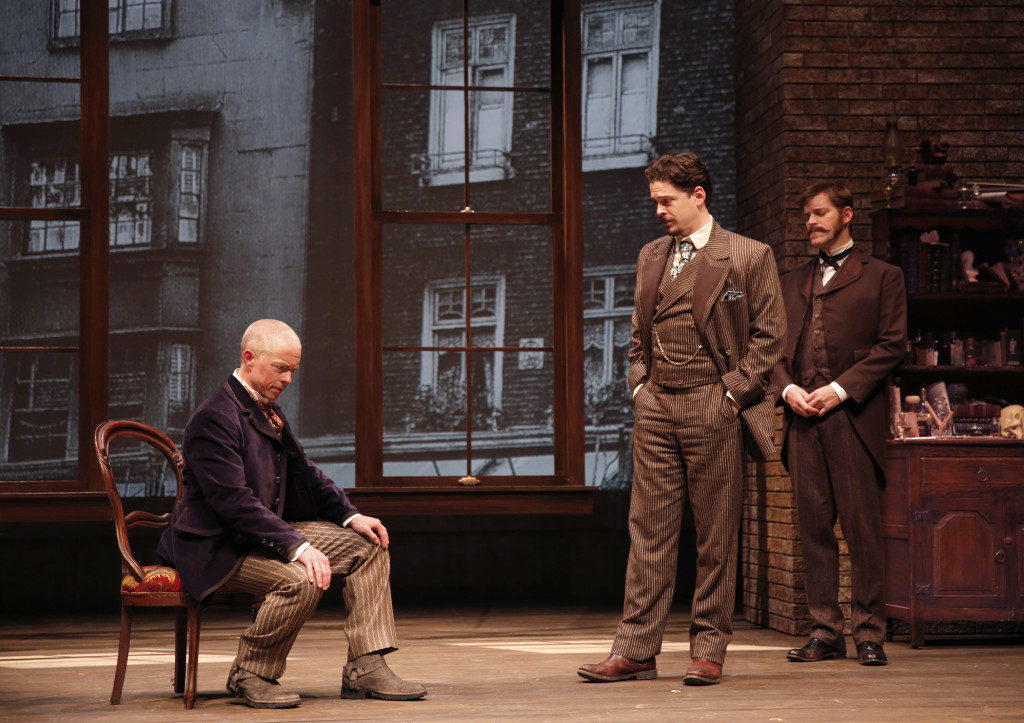Sherlock Holmes is very in at the moment, and if their captivating production of “The Hound of the Baskervilles” is any indication, the Seattle Repertory Theatre is ready to get with the times.
From the acclaimed BBC drama with Benedict Cumberbatch and Martin Freeman, to the somewhat forgettable Robert Downey Jr./Jude Law flicks, to the dramatic “Elementary” with Jonny Lee Miller and Lucy Liu, all eyes are fixed on the world’s favorite sleuth.

The Sherlock trend has appeared once more on the Seattle Repertory Theatre stage, telling the tale of “The Hound of the Baskervilles” with talents like Darragh Kennan and Basil Harris lighting up the theater.
Playwrights David Pichette and R. Hamilton Wright are in on the trend —the Seattle Rep held two sold-out preview performances of their adaptation of Sir Arthur Conan Doyle’s “The Hound of the Baskervilles” last weekend.
Pichette and Wright started working on the show two years ago, and bringing the classic novel to the stage has been a challenging process, with rewrites continuing well into rehearsals.
The cast featured many of Seattle’s most renowned actors, including Seattle Magazine’s Actor of the Year Darragh Kennan and film and TV actor Basil Harris.
“The play would lie flat as a pancake if you didn’t have actors that can just spit [the Victorian language] out and make it natural,” said Pichette. “Everyone [in this cast] has just got so much experience.”
In a departure from the dark, moody Sherlocks of late, Kennan’s Holmes was equal parts squirrelly and sassy. To be honest, Kennan didn’t truly shine until the latter half of the play, when he got the chance to play some eccentric, scene-stealing side characters.
Still, Sherlock isn’t really the star of this one. An excellent Watson (Andrew McGinn) takes center stage through the better part of the show, babysitting the clueless Canadian blowhard Hank Baskerville (Connor Toms). Hilarity ensues, of course, as the two develop the classic buddy cop rapport that Holmes fans have come to expect.
The show was refreshingly lighthearted, particularly when so many recent adaptations have gone the dark and gritty route. I’ll admit, I rolled my eyes when Holmes’s heroin addiction was addressed in the first five minutes —try a little harder to convince us that Sherlock Holmes is, like, totally edgy and hip, why don’t you—but the subject was more or less dropped from then on to make way for wisecracks and melodrama.
Speaking of which, this one won’t go in the pantheon of subdued, artful Sherlock Holmes adaptations. From the stage itself—the proscenium was done up in a faux-brick facade, replete with a red-eyed stone hellhound accent for good measure—to the performances, subtlety was not the order of the day. The play wasn’t worse for it, save for the obnoxious Beryl (Hana Lass), who played the swooning damsel in distress a bit too convincingly.
The set, though, was kept relatively minimal to accommodate the show’s many changes in location. A moving floor, sheer scrim, and modular set pieces were used to great effect, most notably in a brilliantly conceived chase scene. However, set designers overcompensated with countless projected backgrounds, a pet peeve of mine.
Despite the innovative use of space, the play’s aesthetics were quintessential Holmes, through and through —no steampunk weirdness or cell phones here. Costumes, designed by Deborah Trout, were uniformly exquisite and period-appropriate. Music was the only modernized element, with a slight electronica edge overlaid on the standard detective caper tunes.
The classic take on Doyle’s novel was called for, at this point—anything else would have come off as too desperately current, as if the Rep was bending over backwards to keep up with the Sherlock Holmes trend.
Yet, the story was not left untouched. Fans of the novel may be taken aback by Pichette and Wright’s extensive rewrites, including a prolonged dinner scene.
“Whole scenes were made of cloth because we needed a dramatic confrontation,” Pichette said.
The scene heightens tension effectively and improves the story’s pacing for the stage, and the Victorian language never feels overdone. However, it does lengthen the play to a butt-numbing 160 minutes.
“We’ve tried to crunch four or five days of action into a single day,” Wright told The Seattle Times.
The preview went off more or less without a hitch, though a few egregiously bungled lines did show that the cast still has a few kinks to work out.
Despite the melodrama and line delivery hiccups—or perhaps because of them—the Seattle Rep’s The Hound of the Baskervilles made for a fun night out, stripping away the smoke and mirrors of recent adaptations for some good old-fashioned capers.
Worth the price of admission? Elementary, my dear.
Caroline may be reached at copy@su-spectator.com








